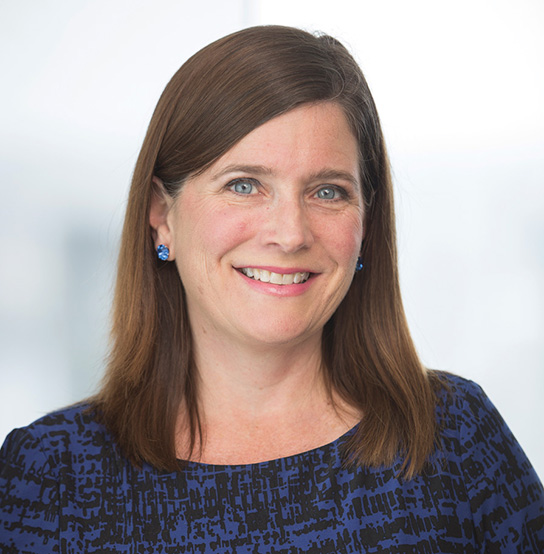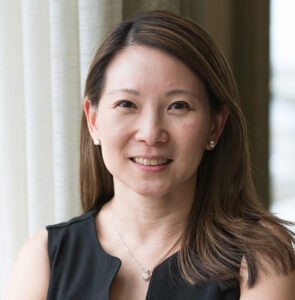
SUMMER 2023

Carolyn Freeman, vice president and head of relationship management at State Street Global Advisors,
Charitable Asset Management Division
Q&A with State Street’s Carolyn Freeman
If Carolyn’s name looks familiar, it is probably because you have established a charitable gift annuity (CGA) or trust with BC. You may have reached out to her with a question or received her newsletter. Or you may have noticed her moniker on mailings from State Street.
In addition to her day job, Carolyn serves as the treasurer for the Planned Giving Group of New England and is involved with the American Legion. She served previously on the Tufts Medical Center gift planning advisory board.
What did you know about BC before it was part of your portfolio?
Growing up in Massachusetts, practically everyone knew somebody who went to BC. For me, it was my uncle, Rick Mercier ’75. BC has always had a great reputation for providing a faith-based liberal arts education—plus football and hockey.
What does State Street provide BC’s donors?
Our investment team only manages planned giving programs. We have years of experience in managing for total return and effective payout rates, and we make sure that we maintain the health of the gift annuity pool. Some of our clients have multiple pools because of state regulations. Some are part of larger programs or smaller programs, so we can see what really creates a healthy program.
Why do you think gift annuities are so popular, versus all the other options?
Gift annuities are easy to understand and to facilitate and donors typically don’t need lawyers involved because the contract is drawn up by Boston College. A gift annuity is a good way for donors to be able to make significant gifts to multiple organizations because the minimum is so much lower than that of a trust. Additionally, in a volatile market, gift annuity payments are not going to be based on market performance. They’re locked in at a rate and donors can count on receiving that payment—regardless of the market fluctuations.
What are the trends you’re seeing in terms of assets that people are giving?
What we’re seeing with existing trusts are cash additions. For new trusts, we’re seeing quite a few real estate-funded gifts. When I first started in this field in the 1990s, trusts were the most popular gift vehicle, gift annuities not so much. And when planned giving really first started back in the 1970s, pooled income funds were all the rage. A lot depends on how markets are performing and interest rates. Today people are doing CGAs, knowing that they’re going to receive a certain payment for their lifetime and knowing how that payment is going to be taxed for their lifetime. CGAs offer a lot of security to older donors.
What should younger donors in their 50s think about when it comes to planning for retirement?
A flip trust is a great option because the trust has an opportunity to grow until the individual is ready to retire. A flip trust is typically a charitable remainder trust funded with real estate. It starts off as a trust with a non-liquid asset not generating income and flips to a regular trust once the real estate is sold and the trust can generate income.
These days, most people seem to change employers every couple of years. What makes State Street special?
It’s definitely clients and the people I work with here—people who are committed to the organizations they work with. I love hearing what’s going on at BC and how it’s helping to make this world a better place. I also love hearing from the donors about why they’ve made a particular gift. It helps connect why we’re here every day. I feel like I am helping make this world a better place. I know that sounds corny, but it really is the truth.
More from this edition
CGA: The Gift that Pays You
A gift to Boston College could provide you with an immediate charitable tax deduction, fixed payments for life, and future support to BC!
A Legacy of Generosity
A recent, generous bequest intention from Esther Chang ’02, JD’07, has deepened her commitment to her alma mater.
Make a Bigger Impact Than You Imagined
Your planned gift is a tangible representation of your belief in BC’s faculty, students, and mission. Truly, gifts like yours help Eagles feel inspired.


